 Tenders and Job Opportunities
Tenders and Job Opportunities Job calls
Job calls Scholarships and research fellowships
Scholarships and research fellowships Open Calls
Open Calls ENGLISH
ENGLISH Pages
Pages
Pages
Developmental Biology Laboratory
Reference: Maria I. Arnone
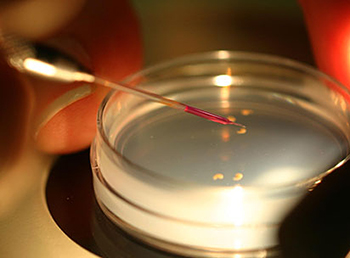 Laboratory dedicated to the study of embryonic development of marine organisms, including functional analysis of gene regulatory networks.
Laboratory dedicated to the study of embryonic development of marine organisms, including functional analysis of gene regulatory networks.
It includes areas for molecular biology and in situ hybridization, microinjection and electroporation of zygotes.
It also includes classic and basic biological laboratory equipments.
Systems for experiments
DevBio Lab uses different model organisms such as ascidians (Ciona, Molgula), sea urchins (Paracentrotus, Strongylocentrotus), sea stars (Patiria), amfioxus (Branchistoma) and fishes (Danio).
The lab carries it activities in collaboration with units Meda e MaRe for collecting, rearing and keeping these organisms.
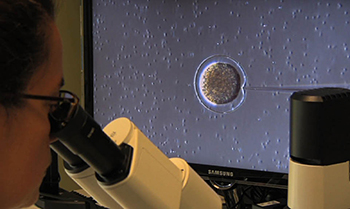 Analysis
Analysis
- Spatial and temporal study of gene expression during embryonic development by in situ hybridization, immunohistochemistry, Real Time qPCR (in collaboration with Mb&Bi unit), western blots.
- Disruption of gene expression (knock-out, knock-down, overexpression and transgenesis) by microinjection (antisense oligonucleotides, RNA) or elecroporation (DNA).
- gene expression and morphofunctional analysis fenotipi ottenuti.
 Equipments
Equipments
- Systems for microinjection (microscopes, including stereo and inverted microscopes) in sea urchins, sea squirts and fish.
- Electroporation in eukaryotic cells.
- Stereomicroscopes for observation and manipulation of embryos.
- Cells thermostated (at various temperatures) for the culture of embryos and larvae.
- Microscopes equipped with high-resolution cameras for spatial analysis of gene expression.
- Analysis of movement to characterize behavioral phenotypes.
Molecular Physiology Laboratory
Reference: Filomena Ristoratore
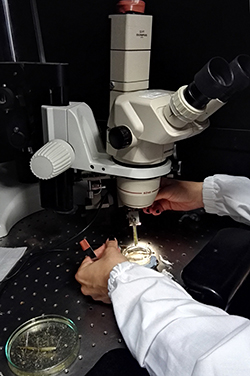 Laboratory equipped for the study of molecular aspects of physiological responses of marine organisms at various stages of life cycle.
Laboratory equipped for the study of molecular aspects of physiological responses of marine organisms at various stages of life cycle.
Includes areas equipped for electrophysiology and molecular biology, cell culture and basic laboratory equipments.
Systems for experimentation
- Genomic amplification and gene expression.
- Electrophysiology.
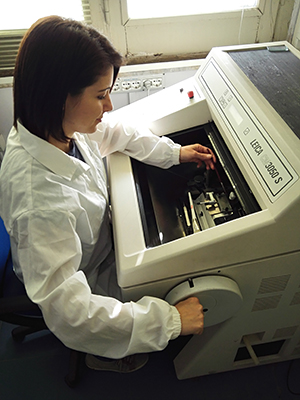 Analysis
Analysis
- Physiological responses of marine organisms to stimuli.
- Membrane potential during fertilization events of marine organisms.
- Electrophysiology and Neurophysiology.
- Physiological analysis of immune responses in marine invertebrates.
Equipments
- Eletrophysiological Set-ups.
- Cell culture apparata.
- Molecular biology (nucleic acids and proteins).
Computational Genomics Laboratory
Reference: Remo Sanges
Laboratory equipped for studies of computational genomics throughout bioinformatics approaches.
Systems for experimentation
Databases, high throughput functional genomics.
Analysis
Computational approaches, bioinformatics, comparative genomics, data-mining (genomics and transcriptomics in marine organisms).
Strumentazioni
- Personal computers.
- Workstations and servers.
Marine Genomics and Epigenetics Laboratory
Reference: Maria Costantini
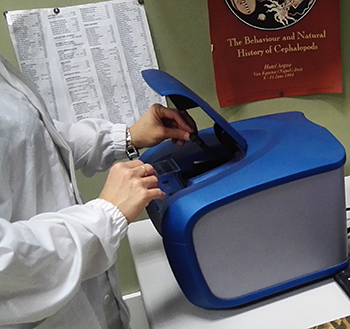 The Laboratory of Marine Genomics and Epigenetics is aimed at developing novel approaches for the study of genomes of marine organisms by applying multidisciplinaty approaches.
The Laboratory of Marine Genomics and Epigenetics is aimed at developing novel approaches for the study of genomes of marine organisms by applying multidisciplinaty approaches.
It encompasses approaches for the study of epigenetic modifications to study the evolution of diversity and adaptative capabilities of organisms.
The Lab includes areas equipped for molecular biology and genomic and proteomic analysis.
Systems for experimentation
- Facilities for molecular analysis applied to the study of genomes of marine organisms.
- Systems for the morpho-functional characterization and genome analysis.
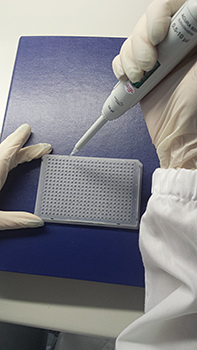 Analysis
Analysis
- Genomic approaches to study genome organization in marine organisms.
- Transcriptomics.
- Genomic analysis of the functioning of marine organisms and systems.
- Gene expression (Real Time qPCR, Western Blot).
- Proteomic approaches to study epigenetic modifications (metilation, de-metilation, acetylation, histone and chromatine modifications, etc.).
- Proteomic approaches (antibodies) to identify epigenetic modifications induced by evolution and interaction of organisms with the environment.
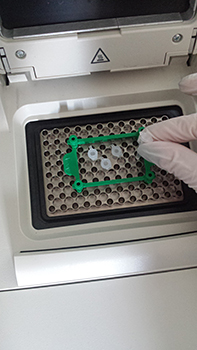 Equipments
Equipments
- Electrophoresis, DNA and proteins.
- PCRs including gradient.
- Scanners for micro-arrays and gene expression.
Ischia Marine Centre (IMC)
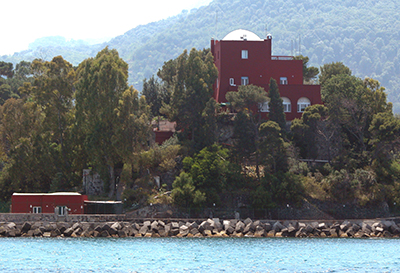 The Ischia Marine Center (IMC) is an interdepartmental center located on the Island of Ischia., The research focus of the IMC is on vulnerability assessment of marine coastal ecosystems and organisms through an integrated approach, highlighting the interactions between anthropogenic activities and climate change, with applications to environmental protection, outreach, and restoration actions. The aim of IMC research activities is to facilitate cooperative research between internal and external researchers, interdisciplinary collaborations, and interactions with public and private stakeholders.
The Ischia Marine Center (IMC) is an interdepartmental center located on the Island of Ischia., The research focus of the IMC is on vulnerability assessment of marine coastal ecosystems and organisms through an integrated approach, highlighting the interactions between anthropogenic activities and climate change, with applications to environmental protection, outreach, and restoration actions. The aim of IMC research activities is to facilitate cooperative research between internal and external researchers, interdisciplinary collaborations, and interactions with public and private stakeholders.
IMC main lines of research include:
1) Benthos ecology: the study of the effects of global changes on biodiversity, plant-animal interaction, and the microbiome associated with marine species.
2) Ecophysiology and biotechnology: the morpho-functional study of coastal communities associated with seagrasses and chemical ecology, also through cultivationof model organisms and research of new biotechnologies.
3) Fisheries oceanography: the study of fish eggs and larvae to understand the variations in abundance and distribution of fish populations related to regional oceanographic factors and global change in climate.
4) Taxonomy of marine organisms: the Marine Organisms Taxonomy Unit (MOTax) at the IMC focuses on the analysis of the benthic communities (sorting, LPT identification, analysis of ecological data).
The IMC is organized into three structures with two functional areas:
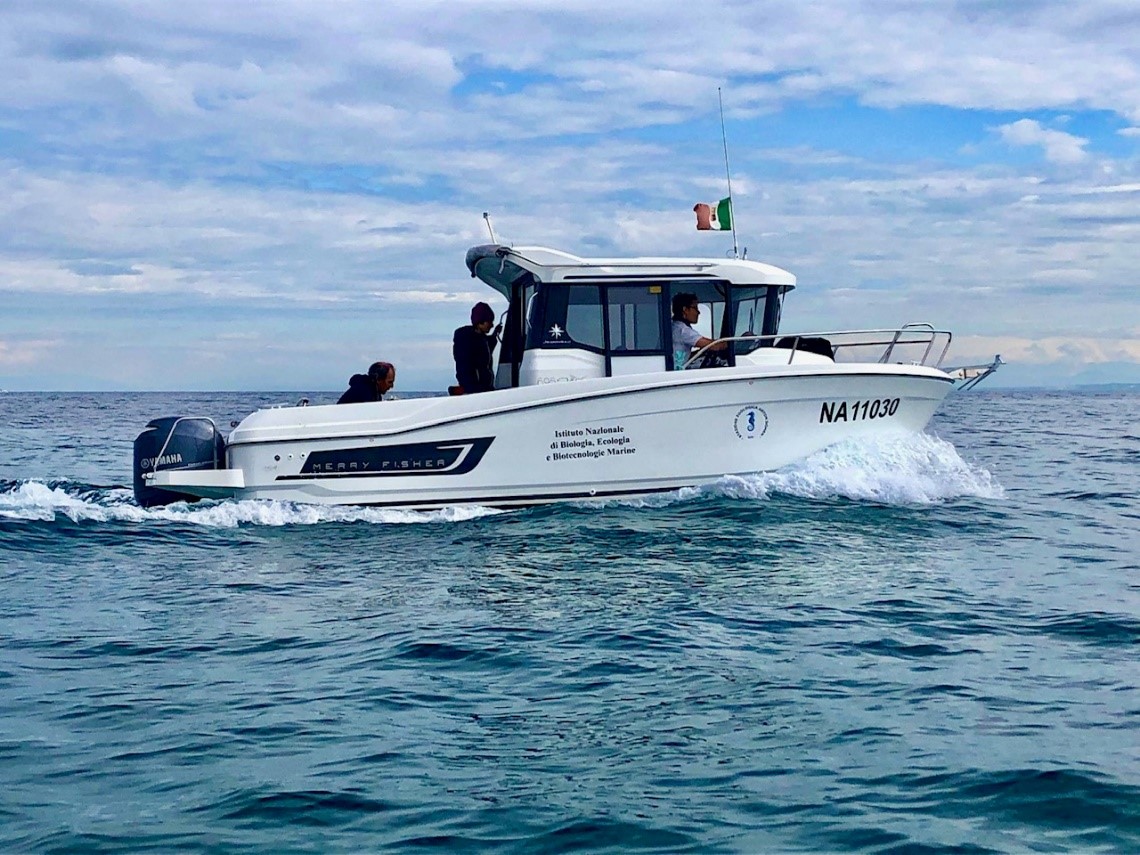 Villa Dohrn, historical site, built in 1906 as the private residence of the Dohrn family. In 1969 the building became the Benthos Ecology Laboratory. Villa Dohrn is currently undergoing a major renovation and repurposing project, to become the new "Research Center for Adaptation of Marine Ecosystems to Climate Change".
Villa Dohrn, historical site, built in 1906 as the private residence of the Dohrn family. In 1969 the building became the Benthos Ecology Laboratory. Villa Dohrn is currently undergoing a major renovation and repurposing project, to become the new "Research Center for Adaptation of Marine Ecosystems to Climate Change".
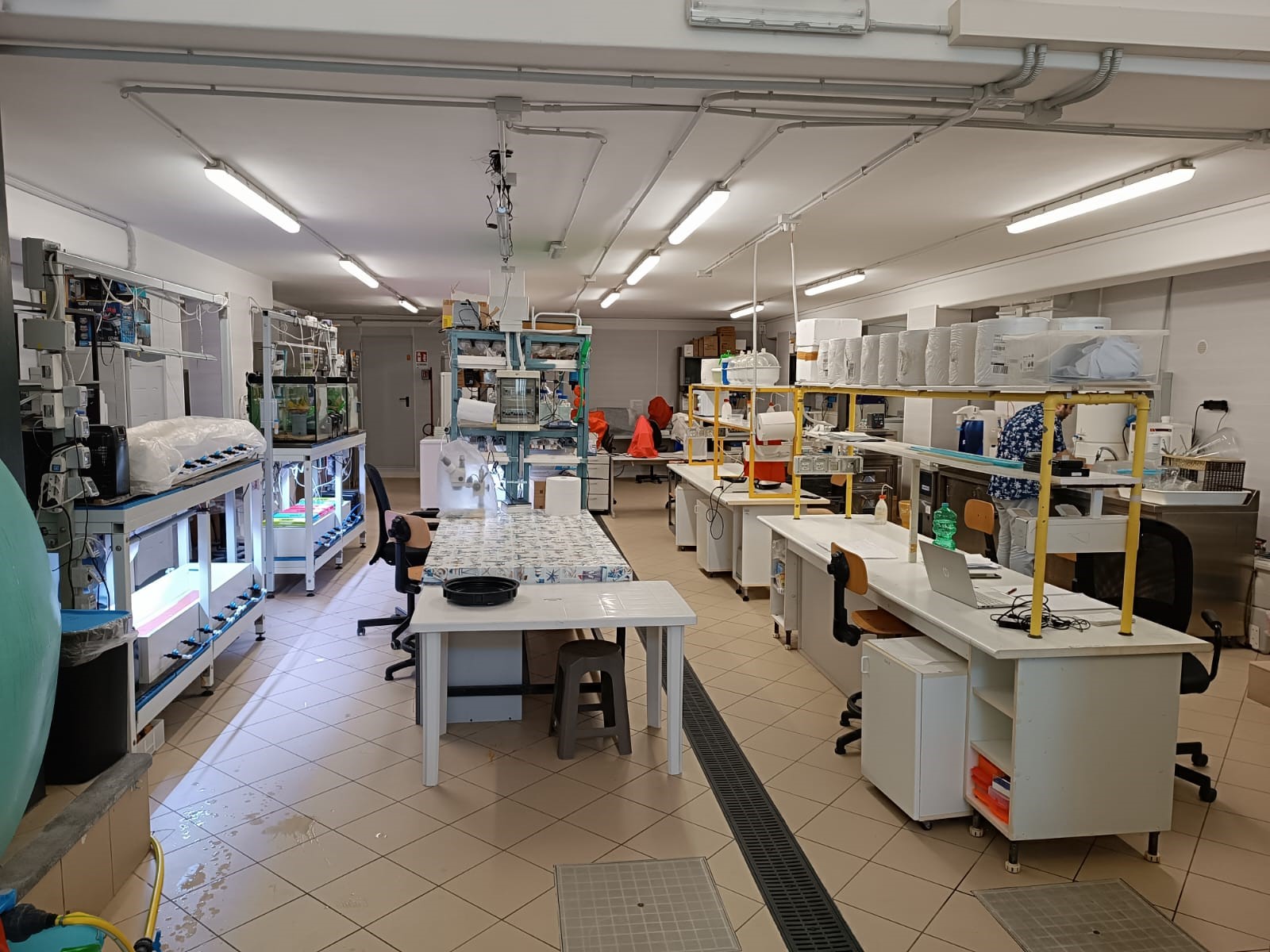 MEDAS Center (Marine Ecological Data Analysis and Synthesis), with the aim of analyzing existing information to address the pressing questions and needs, including economic ones, in the context of Blue Growth. At the momentMEDAS is the operational headquarters of the IMC and the Ecology Functional Area of the Benthos/Nekton for the entire EMI Department of the SZN.
MEDAS Center (Marine Ecological Data Analysis and Synthesis), with the aim of analyzing existing information to address the pressing questions and needs, including economic ones, in the context of Blue Growth. At the momentMEDAS is the operational headquarters of the IMC and the Ecology Functional Area of the Benthos/Nekton for the entire EMI Department of the SZN.
Diving Centre, that oversees scientific diving to support research activities at sea, with Functional Area Diving Center Ischia, located near the mooring of the SZN vessel Beagle Junior, operated by the IMC.
CoordinatorMaria Cristina Vigo Majello |
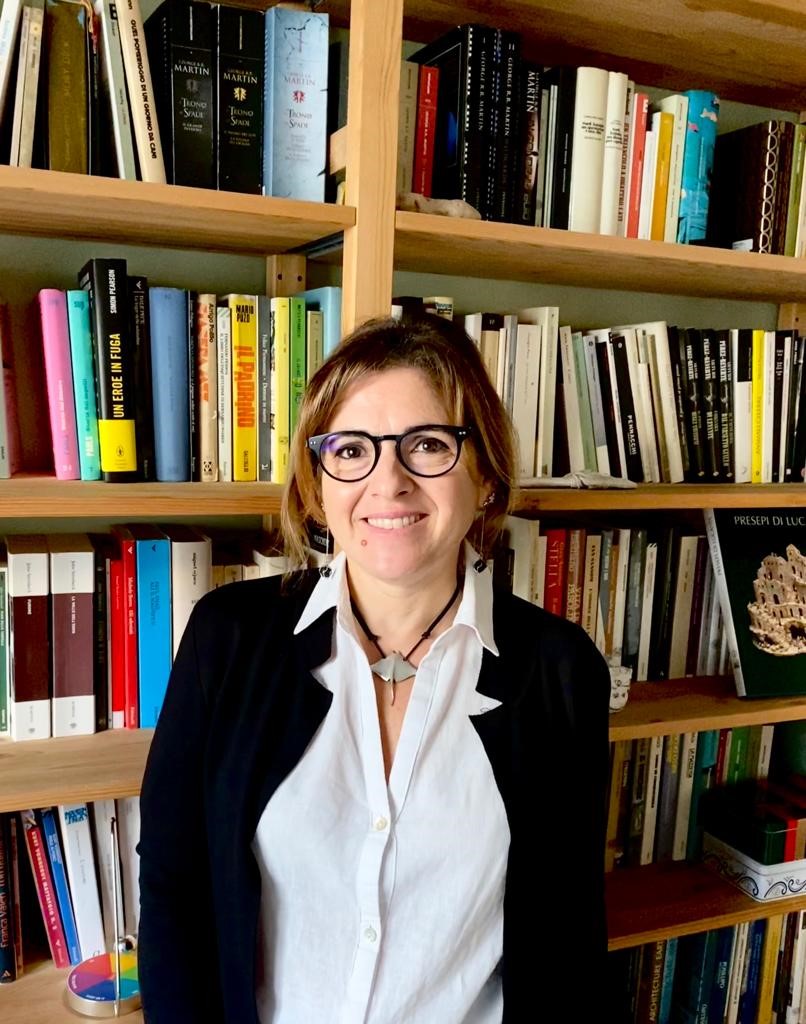 |
Personnel
Coordinator
Maria Cristina Vigo Majello
Administration
Messina Rosanna
Patti Francesco
Senior Researcher
Ciannelli Lorenzo
Teixidó Núria
Zupo Valerio
Researcher
Mazzella Valerio
Technologist
Lorenti Maurizio
Technician
Chiarore Antonia
Guglielmo Rosanna
Iacono Bruno
Mirasole Alice
Rando Vincenzo
Scholarship
Italiano Anna
PhD student
Liguori Gianluca
Nannini Matteo
Somma Emanuele
Facilities/Pilot stations
The staff of Villa Dohrn-Benthic ecology is carrying on long-term research in some sites around the Island of Ischia, which represent pilot stations for continuous and multifacets monitoring of species, communities and ecosystems which have some uniqueness or high ecological importance since include species and habitat protected in the frame of the European Community legislation.
Posidonia oceanica systems off Lacco Ameno and Castello Aragonese
These are two seagrass meadows around the Island of Ischia of the higher plant species Posidonia oceanica, which is protected by the European legislation and it is considered one of the reference habitat for the evaluation of the water quality and ecosystem health in the frame of the Marine Strategy. Both Posidonia meadows have been included in the network of the marine sites of the LTER-Italy ("Italian long-term ecological research network"), and have been studied for various ecological aspects since many years from the staff of Villa Dohrn. Additional details about these two sites and about the LTER-Italy project are available on the specific item (LTER-Italy) of this web site, as well as at: http://www.lteritalia.it
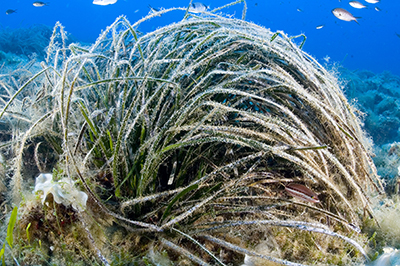
Volcanic CO2 vents of the Castello Aragonese and other sites around the Island of Ischia
These pilot stations represent unique sites where gaseous CO2, from volcanic origin, is bubbling under water, at ambient temperature and salinity, thus provoking only a natural acidification of the surroundings sea-waters. Around the waters of the Castello Aragonese of Ischia, in particular, the bubbling is creating a gradient of pH-pCO2 concentration and acidification affecting mainly the shallow rocky vegetated reef and a nearby shallow Posidonia oceanica system. In the other sites around Ischia, located not far from the Castello vent’s system, the bubbling and local acidification is affecting some of the most typical habitat of the Mediterranean, such as semi-obscure cave habitat, coralligenous outcrops, deeper rocky reefs and Posidonia meadows, as well as sandy and detritic bottoms. As a whole, these sites allow to study in real time the effects of ocean acidification, in relation to the near-future scenarios of climate change, and are utilized by the staff and various collaborators/guests as natural laboratories to perform in situ observation and experiments.
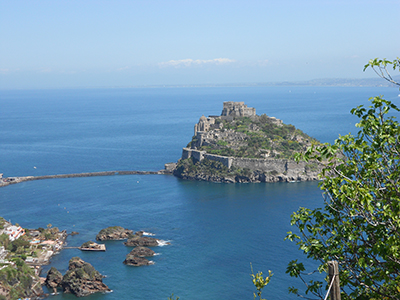
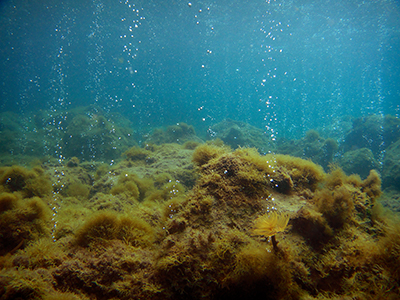
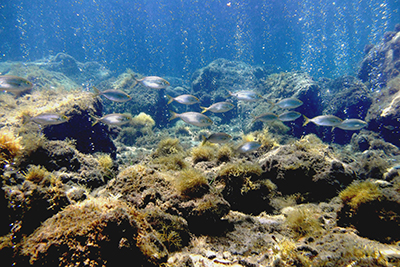
Research project ended in 2014-2015
- ASSEMBLE
- COST-Action Seagrass Productivity ES0906
- Tropical signals (CIESM)
Research project in progress:
- MIUR Project Bandiera RITMARE (2012-2015)
- VulnerClima (Ritmare-Cofund Bandiera)
- "Windows on the future ocean" (National Geographic, USA)
- NEMO (NExt generation Marine Observatories) (Premiali MIUR)
- Premiali ACIDIT
- FP7 - Perseus (Policy-oriented marine environmental research in the southern european seas)
- LTER-Italia
- LifeWatch MedPan
- PTSZN(2013-2015)- Program 4. Environmental variability, climate change and anthropogenic impacts: adaptive responses in species, communities and benthic systems.
Laboratory of Integrative taxonomy of benthic organisms (TIOM)
Responsible: Francesco Paolo Patti
In the laboratory of Integrative taxonomy of benthic organisms (TIOM) one can perform analyses of classical taxonomy, phylogeny and comparative phylogeography of marine organisms using multisciplinary and integrative approaches, such as morphology, biometry, molecular and cellular analyses.
Activities
- Sorting of benthic samples of marine organisms, identification and counting of taxa.
- Taxonomic identification of marine organisms with traditional morphological methods and with more advanced molecular tools (including the preparation of genetic and ecological voucher specimens).
- Extraction and conservation of DNA from different organisms and (algal thalli and invertebrate tissues).
- Extraction of RNA from different organisms (algal thalli and invertebrate tissues).
- Extraction of secondary metabolites.
- Elettrophoresis in agarose minigel and digital documentation.
- Amplification of DNA (ss, ds).
- Cloning of DNA target fragments (plasmid preps, restriction and PCR analysis).
- Real-Time fluorescent Polymerase Chain Reaction.
- DNA barcoding.
- Preparation of DNA fragments for sequencing of target markers (in collaboration with the Unit of Molecular Biology and Bioinformatics of the SZN).
Systems for the experimentation
- Specific laboratory protocol setting
- System of bioinformatics analyses for 1) study of the nucleotidic variability (creation of soft-ware for metadata analyses); 2) study for comparison of morphotypes by mean of morphometric geometry techniques.
Analysis
Analyses of DNA sequences, including the reconstruction of phylogenetic trees.
Analyses of morphological variability and genetic polymorphism.
Analyses of allelic frequencies and genotypic distribution.
Analyses of polymorphysms of the DNA restriction fragments.
Preparation of samples for morphological analyses (use of fixative for observation at the optical and electron microscopes), and for molecular analyses (cryopreservation, standard fixatives, RNALater).
Instrumentation
- Stereomicroscopes.
- Vibratome.
- Rotavapor.
- Chemical flume.
- Laminar flow flume.
- Apparatus for minigel electrophoreris.
- Laboratory refrigerated centrifuge.
- Spectrophotometer "Genequant Pro Classic".
- Termocyclator PCRs (Techne- Euroclone).
- RTPCR BIO RAD Opticon 2.
- Incubator for cell cultures.
- Analytical balance.
- Thermostatic bath (5l, +30°C/+120°C).
- Laboratory Vortex.
- Autoclave/Sterilizer.
- Granular ice-machine.
- Dewars for liquid nitrogen (5l+30l).
- Vertical ultra-freezer -86°C.
- Vertical freezers -20°C.
- UVP BioDoc imaging workstations for simple and gel fluorescence image analyses.
- Dedicated computer for phylogenetic analyses and data mining.
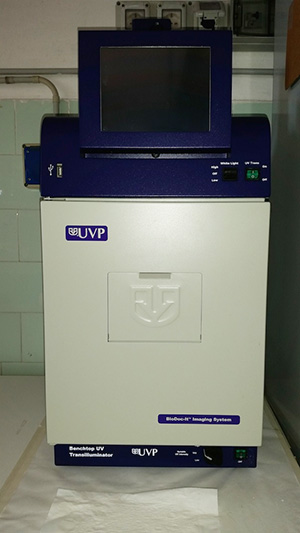

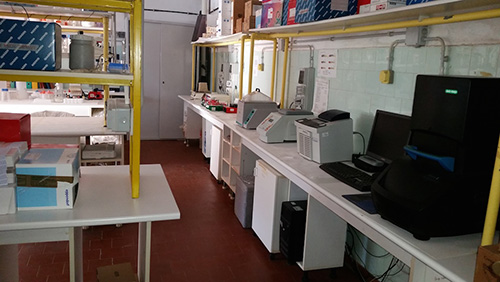


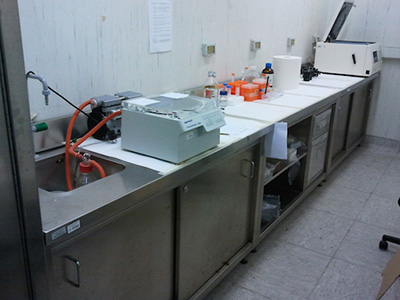

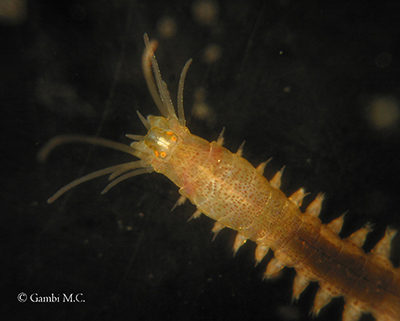

Affiliated Personnel
Coordinator
Senior Scientist
Maria Cristina Buia, responsible BENT lab
Researcher
Technologist
Patti Francesco Paolo, responsabile TIOM lab
Technician
Iacono Bruno, diving officer
Lorenti Maurizio
Rando Vincenzo, Captain of the R/V Phoenicia
PhD Student
Butera Emanuela
Chiarore Antonia
Fioretti Sara
Grech Daniele
Kumar Amit
Mutalipassi Mirko
Napolitano Rachele
Valvassori Giulia
Post Doc
Teixido Nuria
Guglielmo Rosanna
Porzio Lucia
Secretary
Messina Rosanna (part-time at Villa Dohrn)
Fellowships
Maria Beatrice Scipione: senior investigator
Integrative Marine Ecology
Promotes interdisciplinary research on biodiversity, structure and functioning of marine ecosystems.









